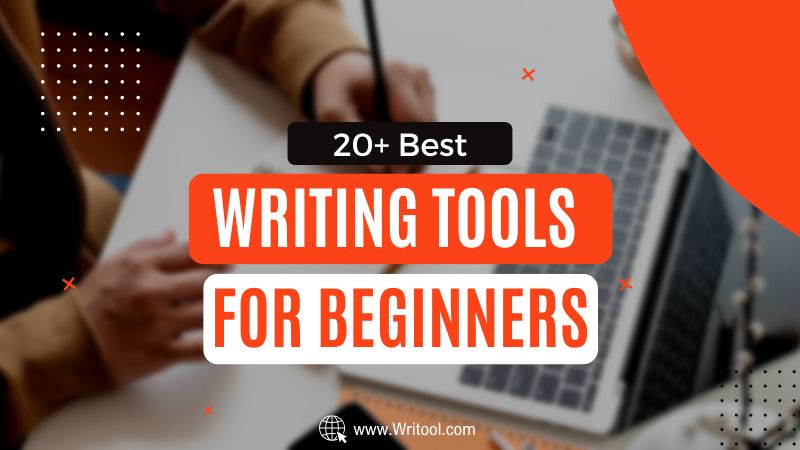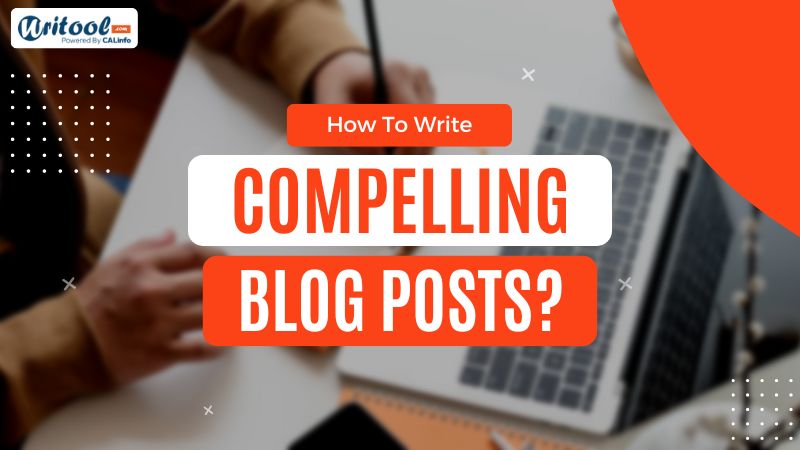Starting as a beginner writer can be overwhelming, with the need to develop ideas, structure your work, and ensure your writing is clear and engaging. However, the right writing tools can help ease this process, providing a sense of relief, improving productivity and refining your writing skills. With so many tools available today, it can be hard to know where to begin. Whether you’re looking to streamline your writing, polish your grammar, or organize your thoughts, the right tools can make all the difference. In this blog, we’ll explore 20+ best writing tools for beginners, from grammar checkers to productivity boosters.
Why Writing Tools are Important for Beginners?
Writing is a skill that requires practice, focus, and the right tools. As a beginner, you’re likely to encounter several challenges—like writer’s block, staying organized, or ensuring your writing is grammatically sound. This is where the writing tools come in.
Best writing tools for beginners not only help you overcome these challenges but also enable you to produce high-quality content faster. By utilizing the right tools, beginners can easily organize thoughts, enhance creativity, and keep writing consistent and free from errors. This empowerment can boost your confidence and put you in control of your writing process.
These tools help to streamline the writing process, allowing you to focus on what really matters—your ideas and words.
20+ Best Writing Tools for Beginners
A. Writing and Editing Software
Scrivener
Scrivener is excellent writing software for beginners who need a tool to organize long-form writing. With features like a corkboard for organizing ideas and a split-screen mode for research and writing, it’s perfect for writers working on novels, essays, or other large projects.
Google Docs
Google Docs is an easy-to-use writing tool that’s perfect for collaboration. You can work on your writing, share it with others for feedback, and access it anywhere. The tool is cloud-based, which means you can always access your files from any device, giving you the flexibility to write whenever and wherever inspiration strikes.
Ulysses
If you’re looking for a distraction-free writing environment, Ulysses is a great choice. Its sleek interface helps you focus on writing while keeping your notes, drafts, and research organized in one place.
Microsoft Word
A classic for a reason, Microsoft Word remains one of the most powerful writing tools. It’s feature-rich, allowing you to create, format, and review documents with ease. The ‘Track Changes’ feature is especially useful for collaborative editing.
B. Grammar and Style Checkers
Grammarly
Grammarly is one of the most popular grammar and spelling checkers on the market. It scans your document for more than just spelling errors and provides suggestions for style, tone, and clarity, making it an essential tool for any writer. It is also one of the most popular and best writing tools for beginners.
ProWritingAid
This tool checks for grammar and analyzes your writing style. It offers detailed reports on pacing, readability, sentence structure, and more, helping you refine your writing over time.
Hemingway Editor
Hemingway Editor is a tool for writing clear, concise, and bold content. It highlights long, complex sentences and common errors, simplifying your writing and improving readability.
Ginger Software
Ginger Software is another solid grammar checker that not only helps with spelling and grammar but also provides translation, text-to-speech, and dictionary functions, making it an all-in-one writing assistant.
C. Plagiarism Checkers
Copyscape
Copyscape is a well-known plagiarism checker. It helps you ensure that your content is 100% original by scanning the web for duplicate content. It’s ideal for anyone looking to create plagiarism-free work.
Turnitin
Turnitin is widely used in academic circles. It checks for plagiarism, helping students, bloggers, and writers ensure that their work is free from copied content.
Quetext
Quetext offers both a free and a pro version. Its plagiarism detection tool is straightforward, making it ideal for beginner writers concerned about originality.
DupliChecker
DupliChecker is a free tool that scans your content for plagiarism. It’s perfect for writers on a budget who want to ensure their content is unique before publishing.
D. Research Tools
Zotero
Zotero is a free tool for organizing your research. Whether you’re writing an academic paper or an in-depth article, it easily collects, organizes, and cites your sources.
Evernote
Evernote is a great note-taking app that helps you gather research, save articles, and even clip content from the web. It syncs across all devices, allowing you to access your notes wherever you go. It is known as another one of the best writing tools for beginners.
Pocket allows you to save articles and videos for later reading. It is an essential tool for writers who often need to gather information and ideas for research and writing.
Mendeley
Mendeley is a reference manager and academic, social network that helps you organize and share research papers. It’s a great tool for beginners who need help organizing research for academic writing.
E. Productivity and Organization Tools
Trello
Trello is a task management platform designed to help you stay organized and keep track of your projects. You can create boards for each project and use lists and cards to track your progress, deadlines, and to-dos.
Notion
Notion is a workspace for note-taking, task management, and collaboration. It’s perfect for organizing writing projects, conducting research, and brainstorming ideas.
RescueTime
RescueTime tracks your digital habits, helping you understand where you’re spending your time. It’s useful for writers who want to stay productive and eliminate distractions.
Focus Booster
Focus Booster uses the Pomodoro technique to help you break your writing into timed intervals with breaks in between. It’s a fantastic tool for staying focused and preventing burnout.
F. Creative Writing Tools
Plottr
Plottr is a tool designed for writers who want to plot out their stories before diving into writing. It helps you create a visual representation of your plot, characters, and settings.
Write or Die
Write or Die is a tool that encourages writers to keep writing by applying pressure. If you stop writing for too long, the tool takes action—whether it’s by adding distractions or providing penalties. It is one of the most useful & best writing tools for beginners.
Airstory
Airstory is a unique writing tool that lets you drag and drop “Airstories”—pieces of content that you’ve written before—into your current project. This feature is perfect for writers who need to reuse content quickly.
The Brain
The Brain is an advanced mind-mapping tool that allows writers to visualize and organize their ideas, making it easier to plan complex writing projects.
How to Choose the Best Writing Tool for Your Needs?
Selecting the right writing tool is crucial for enhancing your writing workflow. Here’s a guide to help you choose the perfect one for your needs:-
Identify Your Writing Focus
Determine the type of writing you do (creative, academic, business, etc.). Tools like Scrivener are great for long-form and creative writing, while Google Docs is better for collaborative work and academic writing.
Consider Key Features
Think about what features you need—grammar checkers, project management, or organizational tools. Grammarly is perfect for grammar, while Trello and Notion help with organization.
Collaboration Needs
If you work with others, choose tools like Google Docs or Quip, which allow real-time collaboration and easy sharing.
Your Writing Style
If you prefer structure, tools like Plottr can help you outline. For free-flowing writing, simpler tools like Bear might be better suited to your style.
Try Free Versions
Many tools offer free trials or versions, so experiment with different ones to see which fits your needs and workflow.
Budget Considerations
Some tools are free (like Google Docs or Hemingway), while others require a subscription (like Scrivener). Start with free tools and upgrade as needed.
Integration with Other Apps
Choose tools that integrate with your existing apps (Google Drive, Dropbox, Trello) for seamless use.
Device Compatibility
Ensure your writing tool works across all your devices for convenience. Google Docs and Evernote sync across devices, making it easy to write anywhere.
7 Key Benefits of Using Writing Tools
Writing tools offer a wide range of benefits that can help beginners refine their writing skills, stay organized, and increase productivity. Here are some key advantages:
Improved Writing Quality
Tools like Grammarly, Hemingway Editor, and ProWritingAid help you write error-free content by offering grammar, spelling, and style suggestions. It ensures your writing is polished and professional, even if you’re just starting.
Enhanced Creativity and Structure
Creative writing tools like Plottr and Scrivener help you organize and structure your ideas, making it easier to craft well-thought-out stories or essays. These tools help you brainstorm, outline, and develop your work step-by-step.
Increased Productivity
Productivity tools like Trello, Notion, and RescueTime help you stay focused and manage your time effectively. You can set deadlines, track progress, and break your work into manageable chunks, which increases your overall productivity.
Better Organization and Research
Research tools like Zotero, Evernote, and Pocket help you collect and organize research, saving you time and effort when writing. Having all your materials in one place allows you to access them easily when needed, ensuring a smoother writing process.
Minimized Distractions
Distraction-free writing environments offered by tools like Ulysses and Focus Booster help you stay focused on the task at hand. These tools limit distractions, allowing you to concentrate on writing and improving your flow.
Time-Saving
Writing tools like plagiarism checkers (Copyscape, Turnitin) and formatting assistants help save time by automating tedious tasks. You won’t have to manually check for grammar, plagiarism, or formatting errors, freeing up more time for creative writing.
Helps You Learn and Improve
Many writing tools offer suggestions and explanations, making them valuable learning tools. As a beginner, you can learn from these suggestions, helping you grow as a writer and avoid making the same mistakes repeatedly.
Conclusion
As a beginner writer, finding the right tools can significantly enhance your writing experience. From grammar checkers to creative writing assistants, these best writing tools for beginners will help you improve your skills, stay organized, and overcome common writing challenges.
Explore the tools listed in this blog and start experimenting to see what works best for you. With the right writing tools, you’ll find your flow and develop as a writer faster than you ever imagined.
FAQs
Can writing tools help improve my writing skills?
Yes, writing tools can significantly improve your skills by offering suggestions for grammar, style, and organization. They help you identify mistakes and refine your writing.
Are writing tools for beginners worth the investment?
If you’re serious about improving your writing, investing in the right tools can be worth it. They save time, improve the quality of your work, and can help you stay motivated.


